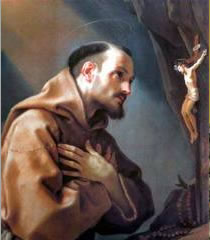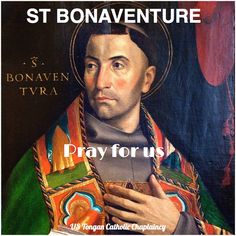Here’s What the Portuguese Want You to Know About St. Anthony of Padua Before World Youth Day
Nuncio said that he hopes that the 1.5 million people expected to visit Lisbon for the youth event this August will discover St. Anthony to be a very helpful intercessor — and not only for lost things.

Everyone’s favorite patron saint of finding lost things is not from where you may think.
The Franciscan saint known around the world as St. Anthony of Padua was not born in the Italian city of Padua but in Lisbon, Portugal.
Portuguese Catholics are quick to point this out to visitors to their capital city. Bernardo Nuncio, a 23-year-old law student from Lisbon, told CNA that he believes there is a “good rivalry” with the Italians over who can claim the 13th-century saint.
“We always tell Italians that he is not from Padua. He is from Lisbon,” Nuncio said.
“But in a friendly way because what in fact matters is what he did for the Church and that is so much bigger than nationality,” he added.
St. Anthony was known in his own day as the “Hammer of Heretics” due to the powerful witness of his life and preaching. He was commissioned by St. Francis of Assisi to teach theology to the friars in 1224 and went on to preach as a missionary in France and Italy before he died at the age of 36. He was proclaimed a doctor of the Church in 1946.
Nuncio, who is a volunteer helping to organize World Youth Day in Lisbon, said that he hopes that the 1.5 million people expected to visit Lisbon for the youth event this August will discover St. Anthony to be a very helpful intercessor — and not only for lost things.
June 13 – St. Anthony of Padua
13th Century Franciscan Preacher
Almighty, eternal God, you have given your people Saint Anthony as an outstanding preacher and intercessor in times of need. Grant that with his help we may follow the example of Christian living and experience your support in all adversities. Amen.
-
13 czerwca – Święto św. Antoniego z Padwy
Franciszkańskiego kaznodziei z XIII wieku
Wszechmogący, wieczny Boże, Ty dałeś swojemu ludowi świętego Antoniego z Padwy, znakomitego kaznodzieję i orędownika ubogich, spraw, abyśmy za jego wstawiennictwem prowadzili życie zgodne z Ewangelią i we wszelkich przeciwnościach doznawali Twojej pomocy. Przez naszego Pana Jezusa Chrystusa, Twojego Syna, który z Tobą żyje i króluje w jedności Ducha Świętego, Bóg, przez wszystkie wieki wieków. Amen
-
dia 13 de junho – Santo Antônio de Pádua
Franciscano, Presbítero e Doutor da Igreja , Século XVIII
Deus eterno, que destes Santo Antônio ao vosso povo como insigne pregador e intercessor em todas as necessidades, fazei-nos, por seu auxílio, seguir os ensinamentos da vida cristã, e sentir a vossa ajuda em todas as provações. Amém.

St. Bonaventure may not be as well-known as Sts. Francis and Anthony, but he is an important figure in both Franciscan history and the history of the medieval Church. A Minister General of the Franciscan Order and a Cardinal and Doctor of the Church, Bonaventure left his mark as a scholastic philosopher and theologian, as well as a mystic writer adding significantly to the spirituality of the Franciscan movement.
Known as the Seraphic Doctor because of his devotion to St. Francis and the Franciscan way of life, St. Bonaventure brought the warmth and affection of Francis’ love of Jesus to bear on the scholastic thought of his day. Thus, his writings show both his highly developed ability to reason and his down-to-earth devotion to the persons of the Trinity and to the Church.
The Man
Born in Bagnorea, Italy, to Giovanni di Fidanza and Maria Ritell in 1221, just five years before the death of St. Francis, St. Bonaventure was baptized John. He received the name Bonaventure when he entered the Order of Friars Minor. Bonaventure entered the Franciscans around 1243 as a member of the Roman Province.
He attended the University of Paris studying under the founder of the Franciscan school there, Alexander of Hales, receiving his licentiate in 1248. This degree afforded him the right to teach, which he did until his election as Minister General of the Order of Friars Minor in 1257, an office he held until May 1274.
Those were difficult times as the Order was split over the issue of the observance of poverty, and Bonaventure wasted no time addressing it. He called several General Chapters at which he proposed corrective legislation. It was at one of these Chapters that the friars asked him to write about the life of St. Francis. This was adopted as the official biography of the Order in 1263.
On June 23, 1273, he was made a cardinal and named the bishop of Albano by Pope Gregory X, whom he both advised and helped prepare for the Second Council of Lyon. While attending that council, he died suddenly on Sunday, July 15, 1274. According to some, he was poisoned.
The Franciscan Theologian
In many ways, Bonaventure remained a simple man of faith and holiness; his life and administration governed by prayer and reflection. Legends have it that when the papal legates came to give him his cardinal’s hat, they found him washing dishes.
He is said to have asked them to hang the hat on a tree until he finished and could dry his hands. Legend also states that he drew attention to a woman hanging her laundry and commented to his fellow clergymen that, in all probability, the woman exceeded all of them in holiness due to her simple faith. Unlike them, he reasoned, she was not burdened by sophisticated learning and the trappings of office.
As a theologian, Bonaventure was able to reflect on the practical aspects of life and see how they interacted with the insights of faith—truly an incarnational approach, which is so typically Franciscan. He was a well-seasoned philosopher and theologian capable of thinking things through carefully in the light of reason drawing truly academic yet pastoral conclusions.
But always a true follower of St. Francis and faithful disciple of Jesus, Bonaventure remained centered in the teachings of the Church.
The Organizer
Like St. Paul, who organized the institutional Church and formulated a Christian spirituality, he gave structure to the Franciscan way of life and the spirituality of St. Francis. Many have described Francis as a dreamer. I don’t know what his Myers-Briggs score would have been, but I do know that he tended to avoid structure and legislation. He wrote his Rule because he had to. It was required by the Church, especially considering the sudden growth in the number of his followers.
St. Francis had wanted to simply live the life of the Gospel and let the Spirit be the guide of the friars. But the very human friars needed more structure and organization in their lives. St. Bonaventure offered that to them without losing the idealism of the Franciscan vision.
The Spiritual Writer
St. Bonaventure saw the spires of the great cathedrals reaching up to heaven as a reflection of the human soul’s reaching up to God in his The Soul’s Journey into God. Likewise, the streams of light coming into the church through the stained-glass windows reflect God expressing himself in the wide variety of creatures upon whom he showers his gifts of grace.
And the images go on and on as the saint reaches into human experience of creation and cultural artifacts and finds vestigium (the footprints) of God since everything in creation reflects in some way the grandeur of God. Human beings, of course, are the actual image of God.
It was this ability to take the spirituality of St. Francis—as reflected in St. Francis’ Canticle of the Sun, for instance—and place it at the heart of his writings, keeping the simplicity of the Franciscan insights and creating a sublime theology that truly deserves the name “Seraphic.”
When Bonaventure was declared a Doctor of the Universal Church in 1588 by Pope Sixtus V, he was given the title “Seraphic Doctor.” Merriam-Webster defines a seraph as one of the highest-ranking angels as well as “one of the six-winged angels standing in the presence of God.” It was as a seraph that Christ appeared to St. Francis when he received the stigmata on Mount La Verna. Therefore, it is fitting to use the term to describe the soaring mysticism of St. Bonaventure.
The Saint
As is true of all saints, St. Bonaventure had—and has—his detractors. While considered the second founder of the Franciscan Order, there are those who feel that he took the community in the wrong direction. But the Order needed organization, and Bonaventure was the man for the job. We’ll let history continue to discern whether he did a good job.
But beyond his organizational and administrative skills, the saint expresses a heart of love after the model of St. Francis. One cannot read The Soul’s Journey into God or the Tree of Life, for example, without feeling the devotion of the saint as he, like St. Francis, almost gushes over the poverty shown in the Incarnation and the love expressed in the Passion of Jesus. In all he did he seems to have been a true Franciscan at heart.
In his bull of canonization, Pope Sixtus IV wrote:
Bonaventure was great in learning, but no less great in humility and holiness. His innocence and dove-like simplicity were such that Alexander of Hales, the renowned doctor whose disciple St. Bonaventure became, used to say of him that it seemed as though Adam had never sinned in him.
July 15 – St. Bonaventure
13th Century Theologian and Teacher
Almighty God, as we celebrate the birthday of St. Bonaventure the bishop, grant us the grace to profit from his excellent teaching and always to imitate the ardor of his love. Amen.
-
15 lipca – Święto św. Bonawentury
Kapłana i doktora Kościoła z XIII wieku
Wszechmogący Boże, obchodzimy narodziny dla nieba świętego Bonawentury, biskupa,spraw, abyśmy czerpali światło z jego nauki i naśladowali jego gorącą miłość. Przez naszego Pana Jezusa Chrystusa, Twojego Syna, który z Tobą żyje i króluje w jedności Ducha Świętego,Bóg, przez wszystkie wieki wieków. Amen.
